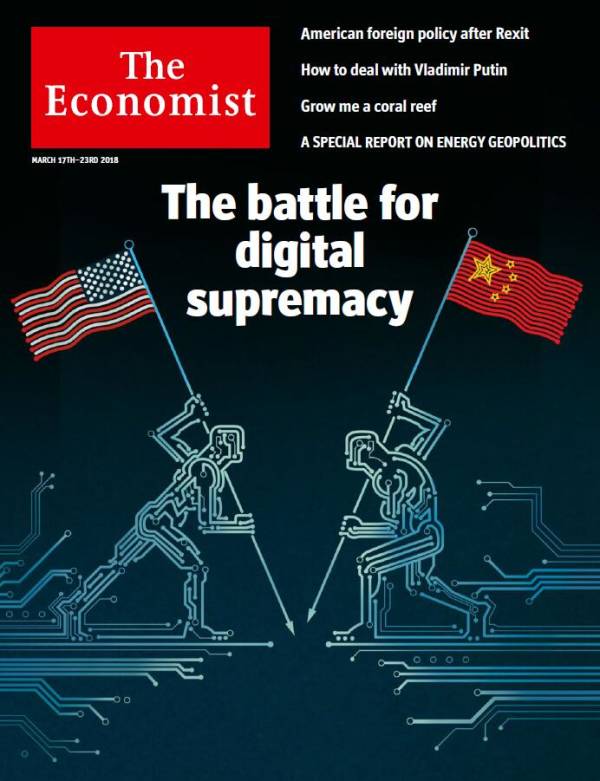

Concerns are growing internationally over the future of American tech development, which may be lagging behind due to China’s robust governance model, a recent cover story of The Economist indicated.

The report, published on March 15, suggested that the US is now rattled by the speed of China’s technological development, because the era of “America the brains and China the brawn” does not exist anymore, and that the US should face the challenge instead of hiding behind the door of protectionism.
Eric Schmidt, former chairman of Alphabet, Google’s parent company, has warned that China will overtake the US in AI by 2025.
China’s world-class tech giants, Alibaba and Tencent, valued at some $500 billion, rival Facebook. Also, China has the largest online-payments market (led by JD.com), the fastest Tianhe-2 supercomputer, the most lavish quantum-computing research center, and the BeiDou Navigation Satellite System, all which can compete with their American counterparts, according to the report.
Meanwhile, the report noted that the heatedly-discussed US-China trade war demonstrated America’s shortsighted vision toward the digital battlefield. The US Congress introduced a bill to stop the government from doing business with two Chinese telecoms firms, Huawei and ZTE, because of alleged intellectual property theft by Chinese companies.
“China’s technological rise requires a strategic answer, not a knee-jerk one,” it commented.
According to Eurasia Group, China has surpassed other countries in terms of active internet-connected devices, with 1.02 billion devices. And CB Insights said that the number of well resourced venture capital raised by tech companies in America and China is fairly close, with $97 billion and $89 billion, respectively.
However, with a 42.3% cut of the budget proposal in non-defense discretionary for 2019, the US will be unable to keep up with China. Meanwhile, skilled immigrants are finding it harder to work in America because of the tightening immigration policy.
The Economist noted that both sides would be harmed economically and worse off in terms of national security if US President Donald Trump continues to promote protectionism.
“America is right to worry about China, but for America to turn its back on the things that made it great is no answer,” it concluded.
 Fire brigade in Shanghai holds group wedding
Fire brigade in Shanghai holds group wedding Tourists enjoy ice sculptures in Datan Town, north China
Tourists enjoy ice sculptures in Datan Town, north China Sunset scenery of Dayan Pagoda in Xi'an
Sunset scenery of Dayan Pagoda in Xi'an Tourists have fun at scenic spot in Nanlong Town, NW China
Tourists have fun at scenic spot in Nanlong Town, NW China Harbin attracts tourists by making best use of ice in winter
Harbin attracts tourists by making best use of ice in winter In pics: FIS Alpine Ski Women's World Cup Slalom
In pics: FIS Alpine Ski Women's World Cup Slalom Black-necked cranes rest at reservoir in Lhunzhub County, Lhasa
Black-necked cranes rest at reservoir in Lhunzhub County, Lhasa China's FAST telescope will be available to foreign scientists in April
China's FAST telescope will be available to foreign scientists in April "She power" plays indispensable role in poverty alleviation
"She power" plays indispensable role in poverty alleviation Top 10 world news events of People's Daily in 2020
Top 10 world news events of People's Daily in 2020 Top 10 China news events of People's Daily in 2020
Top 10 China news events of People's Daily in 2020 Top 10 media buzzwords of 2020
Top 10 media buzzwords of 2020 Year-ender:10 major tourism stories of 2020
Year-ender:10 major tourism stories of 2020 No interference in Venezuelan issues
No interference in Venezuelan issues
 Biz prepares for trade spat
Biz prepares for trade spat
 Broadcasting Continent
Broadcasting Continent Australia wins Chinese CEOs as US loses
Australia wins Chinese CEOs as US loses